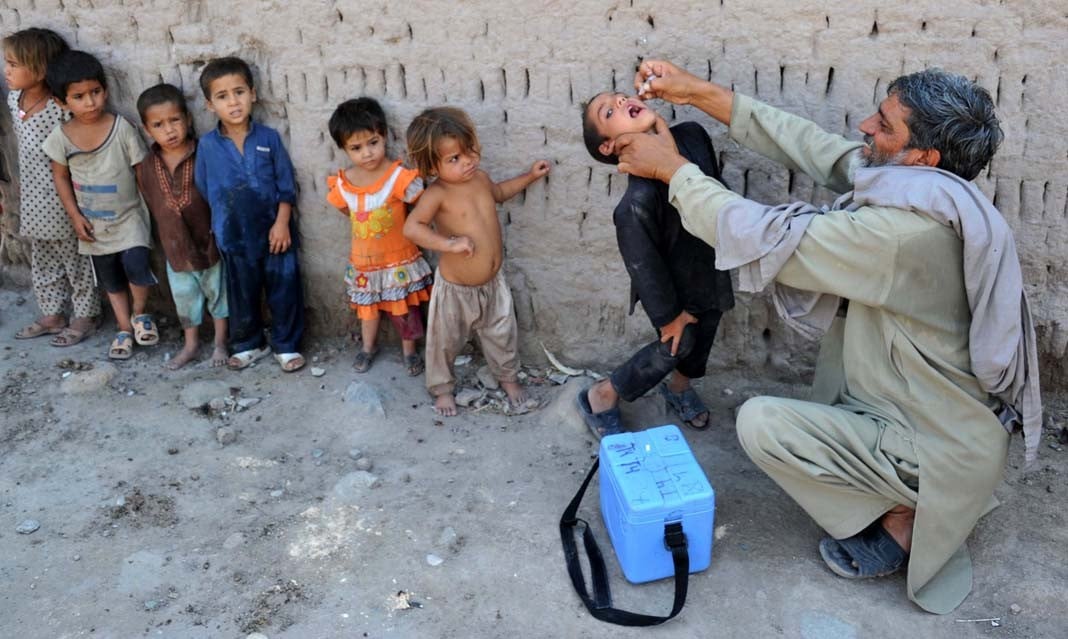
Low literacy rate, lack of professional education and religious misconceptions are main reasons behind refusal to polio drops

Polio is an infectious viral disease which, if not prevented through administering of polio drops in infants and children up to the age of five years, leads to lifelong disability of limbs. A few years ago, Pakistan was well on the way of eradicating this affliction like several other poor countries had done through mass vaccination.
However, since Talibanisation of society, some stray and ill-informed religious leaders spread propaganda against the said vaccination claiming that it was a covert scheme of the government to cause infertility in later years.
According to the report of Global Polio Eradicating Initiative (GPEI) 1998, there are only three polio endemic countries worldwide namely Pakistan, Afghanistan and Nigeria -- this is because of misunderstandings about and lack of interest in polio vaccines in these countries. It must caution us that if we could not eradicate polio, the situation could become more lethal for the upcoming generation.
Unlike other diseases, polio patients are the most vulnerable population in the world, which include pregnant women, and young children under the age of five. Those who are not immunized against polio have greater chances of catching the disease in contrast to those immunized in time. Other risk factors include traveling to places where polio is widespread, living with those infected with polio, working in laboratories where polio virus is kept.
In Pakistan, polio is becoming the fastest spreading infectious disease since 2007. Since 2010, Pakistan has the highest rate of polio cases as the polio endemic country in the world. Between 2010 and 2011, the number of polio cases increased from 144 to 198. Polio-affected areas of Pakistan are divided geographically into four hemispheres -- districts of Balochistan; Peshawar and other districts of Khyber Pakhtunkhwa (KPK); Mohmand, Bajaur, and Khyber agencies of the Federally Administered Tribal Areas (FATA); and some districts of Sindh.
Security threats from armed groups like Taliban are the biggest hurdle in successful vaccination in most of these areas. Targeted killings of health workers in late 2012 and early 2013 made it very difficult to eradicate polio.
The greatest number of cases is registered in KPK, with many vaccine refusal cases emerging after 2007. In 2011, approximately 77 per cent of the polio cases were reported from the Pakhtun population. According to some Pakhtun religious and religio-political leaders, polio vaccines are a Western conspiracy, and that they cause infertility among Muslims.
The worst result taken from all districts of KPK is from the most conservative southern district of Lakki Marwat (LM), as the local community is more orthodox and conservative. LM has an important position with regard to the prevalence of polio due to its geographic location alongside the Taliban-controlled South Waziristan Agency. Therefore, due to a ban on polio vaccination in South Waziristan and North Waziristan, the local Taliban of LM also imposed the same ban in the district. The Taliban threatened families not to get their children immunized. This situation was worsened by the fact that most families in LM have blood relations with the Taliban.
A research, conducted by the National Research and Development Foundation (NRDF) in collaboration with the United Nations’ Children’s Fund (UNICEF) in 2013, found that 733 families in a single union council of LM refused to get their children immunized against polio.
According to officials, there has been a sharp increase in the number of families refusing to have polio vaccination. The first propaganda against polio campaign was initiated in district LM, which then spread to the entire province. The government officials have failed to restore public trust regarding polio vaccination.
The above problem was quantitatively researched by a Quaid-i-Azam University Sociology graduate hailing from LM, Waliullah Marwat, to explore the reasons behind growing refusals to polio vaccination in the district. The main objective was to study trust level of local people in having their children vaccinated.
Major findings of the research are that people perceive vaccination negatively. Refusal to polio immunization has lately increased polio cases drastically. Different reasons found for the refusal to polio drops in LM include low literacy rate, lack of professional education, religious misconceptions, and concerns about infertility.
Talibanisation is also a major factor behind people’s unwillingness to get polio vaccines as there are some religious and militant groups which are continuouly terrorising parents and polio teams. These reasons pose a huge challenge to polio vaccinators in their local campaigns.
Other reasons for refusal to polio drops are lack of trust and interest in effectiveness of the polio vaccines. People also have less knowledge about polio itself. As clear from the research study, people in LM are unaware about the polio disease and its causes and consequences. About 60 per cent people of the district do not know as to what the polio disease is. They are of the view that this disease has been imposed on them from God because of their misdeeds.
Over 68 per cent respondents hold that anti-polio campaign cannot eradicate the disease successfully, as according to them, it is an anti-religious activity and that the polio vaccines also cause different types of dangerous diseases.
To cope with this situation, it is the duty of the government to come forward and take practical steps for the eradication of polio. Security of polio teams must be ensured to facilitate them in carrying out immunisation process. Clergy of local areas must make the people realise that polio vaccination is not an anti-religious phenomenon, and it is safe for health. This will go a long way in restoring public trust in polio vaccination in Pakistan.